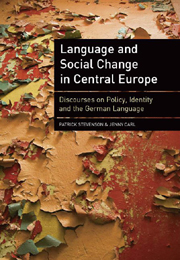Book contents
- Frontmatter
- Contents
- Acknowledgements
- List of Tables
- Transcription Conventions
- Map of Central Europe
- 1 Introduction
- 2 Discourses on Language in Social Life: Theoretical and Methodological Orientations
- 3 Sociolinguistic Histories and the Footprint of German in Eastern Central Europe
- 4 Language Policy Discourses: Interventions and Intersections
- 5 Language (Auto)biographies: Narrating Multilingual Selves
- 6 Language Ideologies: Negotiating Linguistic Identities
- 7 Conclusions
- Appendix A European Institutions and Documents Concerning Language Policy
- Appendix B Preamble to the European Charter for Regional or Minority Languages
- Appendix C Introduction to the 2005 Commission Communication ‘A New Framework Strategy for Multilingualism’
- Appendix D Introduction to the 2008 Commission Communication ‘Multilingualism: an asset for Europe and a shared commitment’
- Appendix E German and Austrian agents and institutions in foreign cultural policy
- Appendix F Extract from ‘Auswärtige Kulturpolitik – Konzeption 2000’
- Appendix G Central focus – ‘Leitbild’ – of the Goethe-Institut
- Appendix H Austria's Auslandskulturkonzept NEU
- Appendix I Plattform Kultur Mitteleuropa – Platform Culture Central Europe
- Appendix J Extract from Austria kulturint – Tätigkeitsbericht 2002
- Appendix K Czech 2001 White Paper on Education
- Appendix L Czech 2004 Education Act
- Appendix M Extract from Czech Follow-up of Action Plan on Language Learning and Linguistic Diversity
- Appendix N Hungarian 1997 Directive Concerning the Education for National and Ethnic Minorities
- Appendix O Extract from 2007 Hungarian National Core Curriculum
- Appendix P Extract from Hungarian Follow-up of Action Plan for Language Learning and Linguistic Diversity
- References
- Index
Appendix B - Preamble to the European Charter for Regional or Minority Languages
Published online by Cambridge University Press: 05 February 2013
- Frontmatter
- Contents
- Acknowledgements
- List of Tables
- Transcription Conventions
- Map of Central Europe
- 1 Introduction
- 2 Discourses on Language in Social Life: Theoretical and Methodological Orientations
- 3 Sociolinguistic Histories and the Footprint of German in Eastern Central Europe
- 4 Language Policy Discourses: Interventions and Intersections
- 5 Language (Auto)biographies: Narrating Multilingual Selves
- 6 Language Ideologies: Negotiating Linguistic Identities
- 7 Conclusions
- Appendix A European Institutions and Documents Concerning Language Policy
- Appendix B Preamble to the European Charter for Regional or Minority Languages
- Appendix C Introduction to the 2005 Commission Communication ‘A New Framework Strategy for Multilingualism’
- Appendix D Introduction to the 2008 Commission Communication ‘Multilingualism: an asset for Europe and a shared commitment’
- Appendix E German and Austrian agents and institutions in foreign cultural policy
- Appendix F Extract from ‘Auswärtige Kulturpolitik – Konzeption 2000’
- Appendix G Central focus – ‘Leitbild’ – of the Goethe-Institut
- Appendix H Austria's Auslandskulturkonzept NEU
- Appendix I Plattform Kultur Mitteleuropa – Platform Culture Central Europe
- Appendix J Extract from Austria kulturint – Tätigkeitsbericht 2002
- Appendix K Czech 2001 White Paper on Education
- Appendix L Czech 2004 Education Act
- Appendix M Extract from Czech Follow-up of Action Plan on Language Learning and Linguistic Diversity
- Appendix N Hungarian 1997 Directive Concerning the Education for National and Ethnic Minorities
- Appendix O Extract from 2007 Hungarian National Core Curriculum
- Appendix P Extract from Hungarian Follow-up of Action Plan for Language Learning and Linguistic Diversity
- References
- Index
Summary
The member States of the Council of Europe signatory hereto,
Considering that the aim of the Council of Europe is to achieve a greater unity between its members, particularly for the purpose of safeguarding and realising the ideals and principles which are their common heritage;
Considering that the protection of the historical regional or minority languages of Europe, some of which are in danger of eventual extinction, contributes to the maintenance and development of Europe's cultural wealth and traditions;
Considering that the right to use a regional or minority language in private and public life is an inalienable right conforming to the principles embodied in the United Nations International Covenant on Civil and Political Rights, and according to the spirit of the Council of Europe Convention for the Protection of Human Rights and Fundamental Freedoms;
Having regard to the work carried out within the CSCE and in particular to the Helsinki Final Act of 1975 and the document of the Copenhagen Meeting of 1990;
Stressing the value of interculturalism and multilingualism and considering that the protection and encouragement of regional or minority languages should not be to the detriment of the official languages and the need to learn them;
- Type
- Chapter
- Information
- Language and Social Change in Central EuropeDiscourses on Policy, Identity and the German Language, pp. 212 - 213Publisher: Edinburgh University PressPrint publication year: 2010

